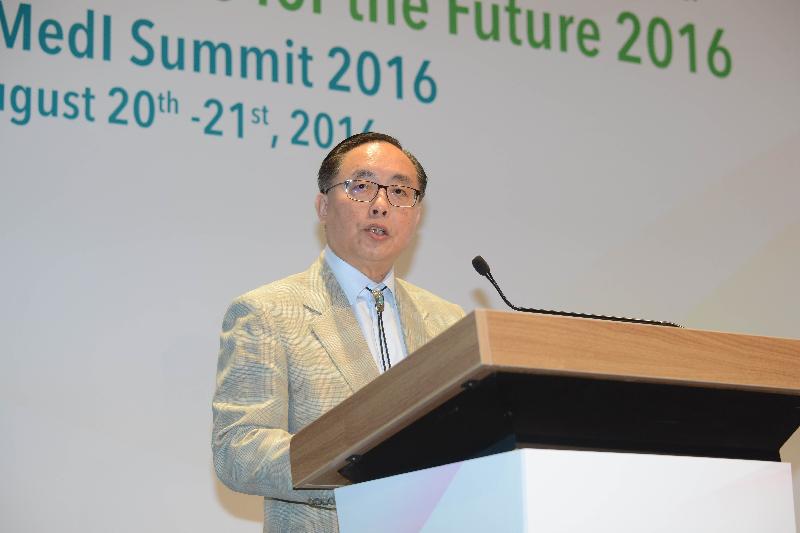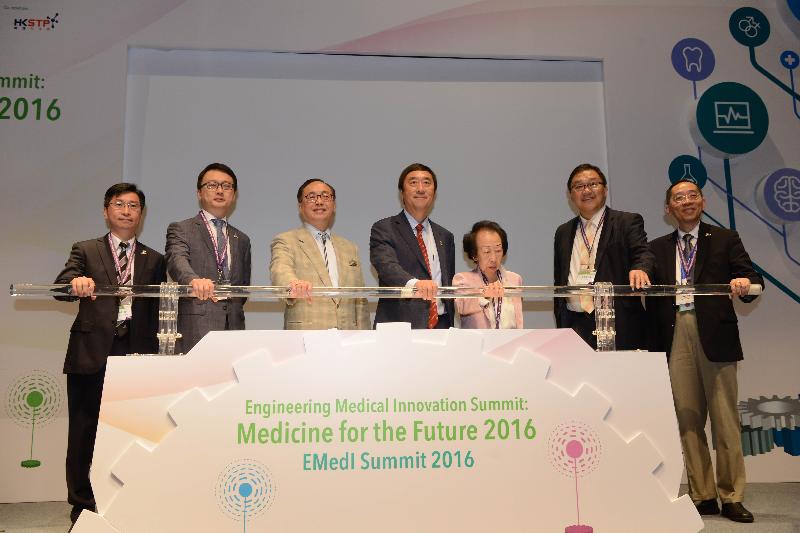Speech by S for IT at opening ceremony of Engineering Medical Innovation Summit: Medicine for the Future 2016 (English only) (with photos)
******************************************************************************************
Joseph (Vice-Chancellor and President of the Chinese University of Hong Kong, Professor Joseph Sung), Ms Chow (Solicitor, Notary Public and China Appointed Attesting Officer, Ms Therese Chow), Andrew (Chief Commercial Officer of the Hong Kong Science and Technology Parks Corporation, Mr Andrew Young), distinguished guests and speakers, ladies and gentlemen,
Good afternoon to you all and welcome to Hong Kong Science Park.
It is my pleasure to join you all at the opening of the Engineering Medical Innovation Summit today. I would like to extend our warmest welcome to the speakers and guests from all over the world.
In recent years, technology breakthrough such as robotics, biomedical imaging and medical sensing, and new materials have led to significant advance in medical sciences and practices. At the same time, commercialisation of technologies such as mobile sensing and Internet of Things, also known as IoT, enable early detection of medical conditions and help save lives. For example, sensors can now be worn or implanted easily by healthcare professionals for health monitoring and maintenance purposes.
Under the joint efforts of medical specialists, healthcare practitioners and engineering professionals, we are now able to address healthcare problems in a multi-disciplinary way. For example, successful application of precision robotic or mechatronic tools in remote surgery, emergency response or surgical simulation and training all require close collaboration among medical practitioners and engineers.
Hong Kong is well positioned to take advantage of the global trend in adopting medical technologies, ICT and IoT to deliver cost-effective and quality healthcare solutions and services. Over the years, the Innovation and Technology Fund of the HKSAR Government has supported many innovative applied research projects in biotechnology and medical technologies. Most of these are undertaken by researchers from world-class universities in Hong Kong.
Hong Kong is blessed to have an abundant supply of quality talents both locally and from overseas. One of the work priorities of the HKSAR Government is to augment this pool of innovation and technology talents, and inspire the younger generation to pursue a career in innovation and technology, thereby enhancing the competitiveness of Hong Kong. In this year's Policy Address, the Government has committed to set up a new $2 billion Midstream Research Programme for universities to encourage our universities to collaborate with each other, and conduct more inter-disciplinary and translational R&D work.
In addition, in collaboration with the Ministry of Science and Technology of the People’s Republic of China, 16 Partner State Key Laboratories have been established in six local universities. These Laboratories, together with the six Hong Kong branches of the Chinese National Engineering Research Centres will conduct R&D in a diverse range of disciplines. The Government will also allocate over $100 million a year to support these Laboratories and Centres. With these initiatives, we hope more research outcome will be available to further downstream R&D research and commercialisation.
Over the years, the Chinese University of Hong Kong has always been a pioneer in the field of biomedical engineering, capitalising on its innovative research and experiences in clinical application. The establishment of the Chow Yuk Ho Technology Centre for Innovative Medicine further enhances the institution’s capability in multi-disciplinary research and collaboration among different scientific and engineering disciplines.
I would like to thank the Chinese University of Hong Kong and the Hong Kong Science Park for giving me the opportunity to join this innovation sharing in medicine for the future. I wish all of you a wonderful and fruitful exchange today.
Thank you very much.
Ends/Saturday, August 20, 2016
Issued at HKT 16:46
Issued at HKT 16:46
NNNN




